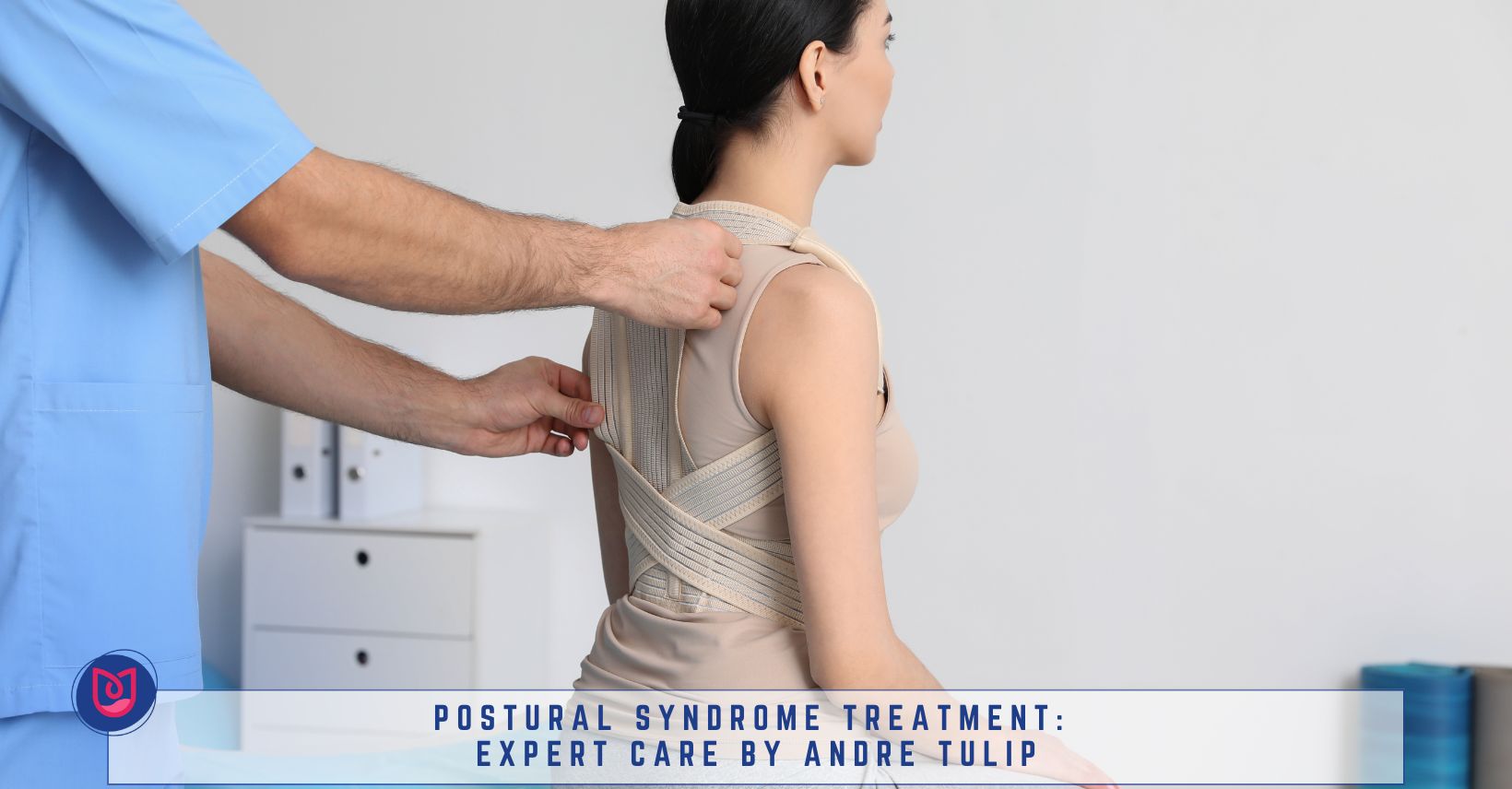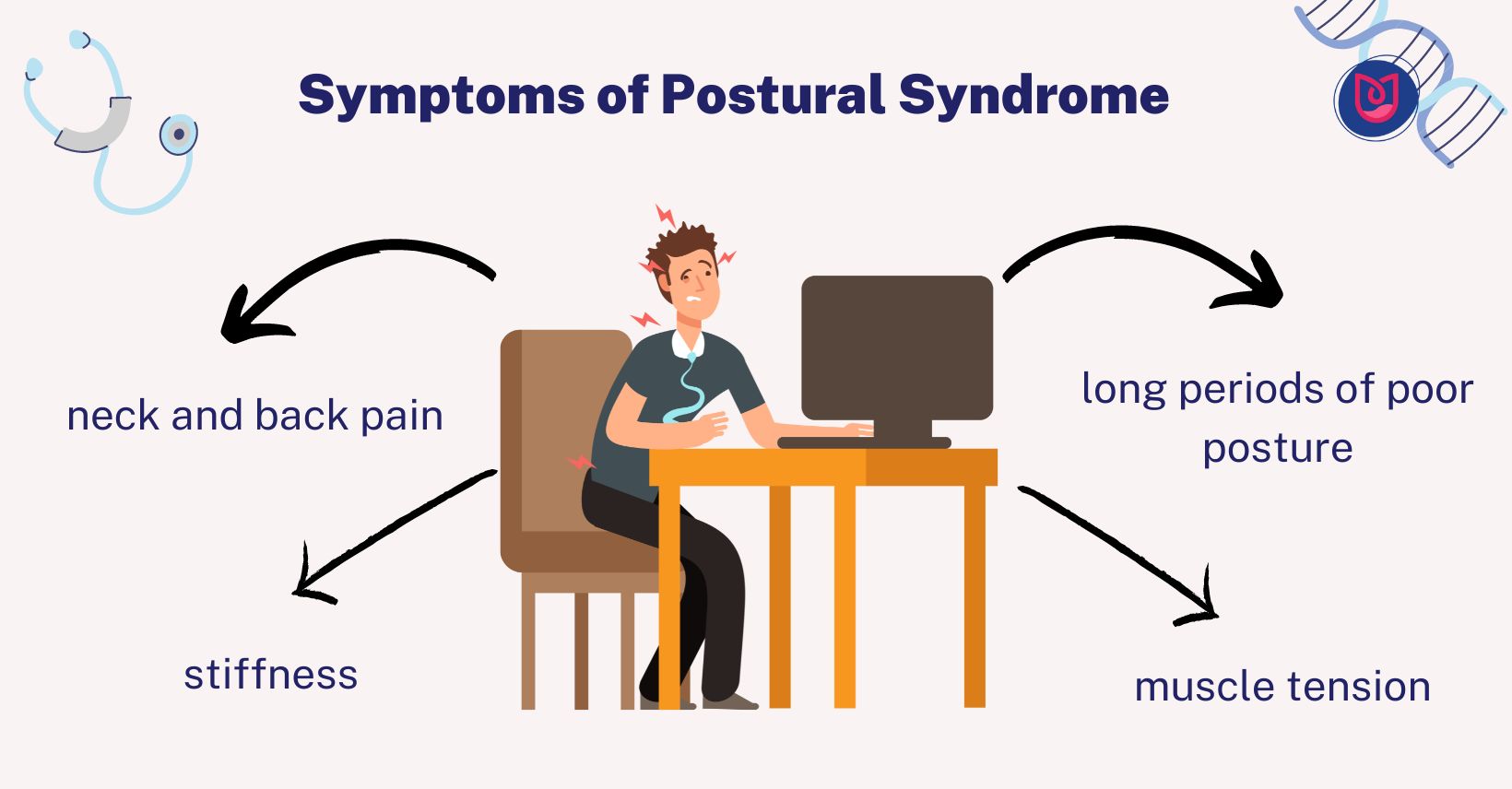
Are you experiencing discomfort due to poor posture? Postural Syndrome is a common issue that, if left untreated, can lead to a range of health problems.
We explore Postural Syndrome, its prevalence, and the importance of seeking expert care. From accurate diagnosis to personalised treatment plans, we examine the comprehensive approach to postural syndrome.
If you’re ready to improve your posture and alleviate discomfort, keep reading to discover how we can help you on your journey to better health.
What is Postural Syndrome?
Postural Syndrome arises from sustained poor posture, leading to muscle imbalances and nerve compression, manifesting as musculoskeletal pain. Over time, poor posture causes some muscle groups to tighten and others to weaken, increasing strain on joints and muscles. This imbalance can cause significant discomfort, and when the spine’s alignment is compromised, it may lead to nerve impingement or irritation, resulting in pain, numbness, or tingling.
How Common is Postural Syndrome?
Postural Syndrome is widespread, often developing from habitual behaviours that lead to poor posture and, subsequently, various spinal issues. Studies indicate that about 80% of individuals will encounter back pain at some point, frequently due to poor posture. Habits such as slouching while sitting or excessive smartphone use exacerbate these issues, especially among those who sit for extended periods.
What are the main Symptoms of Postural Syndrome?

The primary symptoms of Postural Syndrome include neck and back pain, stiffness, and muscle tension, often exacerbated by long periods of poor posture. These symptoms can severely impact daily activities and underscore the necessity of seeking a physiotherapist to manage the condition effectively and prevent more severe complications.
The Importance of Seeking a Physiotherapist
Effective treatment and long-term management of Postural Syndrome require expert care, emphasising the importance of early consultation and intervention. This approach helps prevent further complications like nerve irritation and chronic pain, leading us to understand why treatment is vital.
Why is it Important to Seek Treatment for Postural Syndrome?
Seeking treatment for Postural Syndrome is essential to relieving pain, making necessary spinal adjustments, and avoiding long-term damage to the musculoskeletal system. Treatment typically involves spinal adjustments to improve alignment, enhancing posture and overall bodily function. These adjustments help provide immediate relief and foster the body’s natural healing capabilities.
What are the Risks of Not Seeking Treatment?
Ignoring treatment for Postural Syndrome can lead to severe complications, including chronic nerve compression, abnormal spinal curvature, and recurrent muscle spasms. These issues can restrict motion and complicate daily tasks, potentially exacerbating existing conditions and leading to serious disorders like herniated discs or degenerative disc disease. The consequences of untreated Postural Syndrome extend beyond physical symptoms, affecting overall quality of life and emphasising the need for expert intervention.
Meet Our Specialist: Andre Tulip
At Physio Sunderland, Andre Tulip, a distinguished specialist, leads the treatment of Postural Syndrome. His expertise and commitment to enhancing spinal health significantly improve patients’ quality of life.
Who is Andre Tulip?
Andre Tulip is a renowned specialist at Physio Sunderland with extensive experience treating musculoskeletal conditions, particularly Postural Syndrome. He combines a Bachelor’s degree in Physiotherapy with over a decade of practical experience to provide effective, personalised care that addresses each patient’s unique needs.
What Makes Andre Tulip an Expert in Postural Syndrome Treatment?
Andre Tulip’s expertise in Postural Syndrome treatment stems from his profound knowledge of manual therapy and personalised exercise regimens. His approach alleviates pain and corrects postural imbalances, enhancing overall functionality and posture.
Our Approach to Postural Syndrome Treatment
Our treatment method for Postural Syndrome at Physio Sunderland begins with a thorough assessment by Andre Tulip, followed by a personalised treatment plan designed to restore spinal health and improve posture.
Step 1: Accurate Diagnosis by Andre Tulip
Andre Tulip conducts a comprehensive assessment to accurately diagnose Postural Syndrome, using physical examinations and imaging tests like X-rays or MRIs to examine the spine and musculoskeletal structure in detail.
Step 2: Personalised Treatment Plan
Following diagnosis, a personalised treatment plan is developed, incorporating manual therapy, specific exercises, and stretches to meet the individual’s needs. The plan focuses on strengthening muscles, improving flexibility, and maintaining proper alignment.
Step 3: Ongoing Support and Follow-up Care
Continued support and regular follow-up care are essential to ensure long-term spinal health, with adjustments to optimise treatment effectiveness and prevent further complications.
What to Expect During Postural Syndrome Treatment with Andre Tulip?
Patients undergoing Postural Syndrome treatment with Andre Tulip can anticipate a comprehensive approach involving physiotherapy exercises, spinal adjustments, and educational guidance on maintaining correct posture for sustainable health benefits.
Ready for a Therapy Session with Andre Tulip? Book Your Appointment Today!
If you’re prepared to improve your spinal health, book your consultation with Andre Tulip at Physio Sunderland today and embark on your personalised treatment journey toward a healthier, more active life.
Frequently Asked Questions
What triggers Postural Syndrome?
Postural Syndrome is often triggered by prolonged poor posture and habits that strain the musculoskeletal system. Sedentary behaviours, such as hours spent hunched over computers or frequently looking down at smartphones, place excessive strain on the neck, shoulders, and back. Repetitive activities like carrying heavy bags on one shoulder or using improper lifting techniques also contribute to muscle and joint imbalances, leading to chronic pain and discomfort.
What does someone with poor posture look like?
Individuals with poor posture might show signs like slumped shoulders, a forward head position, and abnormal spinal curvature. Slumped shoulders, typically from weakened upper back and chest muscles, cause the shoulders to roll forward. A forward head position strains neck muscles, potentially causing headaches and neck pain, while abnormal spinal curvatures like kyphosis or lordosis affect balance and body alignment.
Can bad posture cause stomach issues?
Yes, poor posture can lead to stomach issues by compressing nerves and causing muscle imbalances that disrupt digestion. Incorrect sitting or standing postures can pressure digestive nerves, decrease digestive efficiency, and lead to symptoms like bloating, constipation, and acid reflux. Additionally, muscle imbalances can misalign organs involved in digestion, worsening these issues.
Can you reverse years of bad posture?
Reversing years of poor posture is possible through consistent treatment, including targeted exercises and spinal adjustments. Correcting posture requires a long-term commitment to exercises and regular adjustments that strengthen muscles, enhance flexibility, and retrain the body to maintain proper alignment. Persistence is essential, as muscle memory and alignment changes take time but can significantly improve overall posture and musculoskeletal health.
Is Postural Syndrome Treatment by Andre Tulip suitable for all ages?
Yes, Postural Syndrome affects individuals across all age groups, and Andre Tulip’s treatment is adaptable for everyone. His expertise allows him to create treatment plans for the unique needs of patients from various age ranges, ensuring appropriate care for each individual.
Can I expect long-term results from Postural Syndrome treatment by Andre Tulip?
Absolutely. Andre Tulip aims to provide immediate relief and improve long-term posture and pain management. His treatment plans include exercises and advice designed to sustain improvements and prevent the recurrence of Postural Syndrome, ensuring enduring benefits for patients’ posture and overall health.